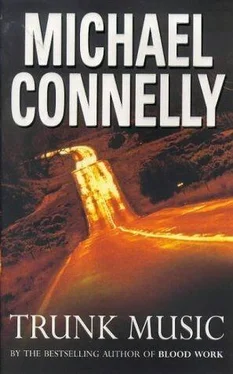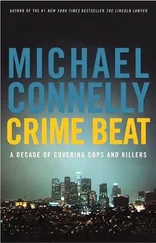“At Men’s Central. What’s up?”
“Do you have Luke Goshen with you?”
“No, we just dropped him off. Why, what is it?”
“Give me the booking number.”
Bosch hesitated a moment but then held the phone under his chin while he reopened his briefcase and got the number from the booking receipt. He gave Billets the number and once again asked what was going on. She once again ignored the question.
“Detective,” she said, “I want you to come over to Parker right away. The sixth-floor conference room.”
The sixth floor was administration level. It was also where the Internal Affairs offices were. Bosch hesitated again before finally answering.
“Sure, Grace. You want Jerry, too?”
“Tell Detective Edgar to go back to Hollywood Division. I’ll contact him there.”
“We’ve only got the one car.”
“Then tell him to take a cab and put it on his expense account. Hurry it up, Detective. We are waiting for you here.”
“We? Who’s waiting?”
She hung up then and Bosch just stared at the phone for a moment.
“What is it?” Edgar asked.
“I don’t know.”
Bosch stepped off the elevator into the deserted sixth-floor hallway and proceeded toward the conference room he knew was behind the last door before the entrance to the police chief’s office at the end of the hall. The yellowed linoleum had been recently polished. As he walked toward his destiny with his head down, he saw his own dark reflection moving just in front of his steps.
The door to the conference room was open and as Bosch stepped in all eyes in the room were on him. He looked back at Lieutenant Billets and Captain LeValley from the Hollywood Division and the recognizable faces of Deputy Chief Irvin Irving and an IAD squint named Chastain. But the four remaining men gathered in chairs around the long conference table were strangers to Bosch. Nevertheless, he guessed from their conservative gray suits that they were feds.
“Detective Bosch, have a seat,” Irving said.
Irving stood up, ramrod straight in a tight uniform. The dome of his shaven head shone under the ceiling fluorescents. He motioned to the empty seat at the head of the table. Bosch pulled the chair out and sat down slowly as his mind raced. He knew that this kind of showing of brass and feds was too big to have been caused by his affair with Eleanor Wish. There was something else going on and it involved only him. Otherwise, Billets would have told him to bring Edgar along.
“Who died?” Bosch asked.
Irving ignored the question. When Bosch’s eyes traveled across the table to his left and up to Billets’s face, the lieutenant glanced away.
“Detective, we need to ask you some questions pertaining to your investigation of the Aliso case,” Irving said.
“What are the charges?” Bosch responded.
“There are no charges,” Irving replied calmly. “We need to clear some things up.”
“Who are these people?”
Irving introduced the four strangers. Bosch had been right, they were feds: John Samuels, an assistant U.S. Attorney assigned to the organized crime strike force, and three FBI agents from three different field offices. They were John O’Grady from L.A., Dan Ekeblad from Las Vegas and Wendell Werris from Chicago.
Nobody offered to shake Bosch’s hand, nobody even nodded. They just stared at Bosch with looks that transmitted their contempt for him. Since they were feds, their dislike of the LAPD was standard issue. Bosch still couldn’t figure out what was going on here.
“Okay,” Irving said. “We’re going to get some things cleared up first. I’m going to let Mr. Samuels take it from here.”
Samuels wiped a hand down his thick black mustache and leaned forward. He was in the chair at the opposite end of the table from Bosch. He had a yellow legal tablet on the table in front of him but it was too far away for Bosch to be able to read what was on it. He held a pen in his left hand and used it to hold his place in his notes. Looking down at the notes, he began.
“Let’s start with your search of Luke Goshen’s home in Las Vegas,” Samuels said. “Exactly who was it who found the firearm later identified as the weapon used in the killing of Anthony Aliso?”
Bosch narrowed his eyes. He tried looking at Billets again, but her eyes were focused on the table in front of her. As he scanned the other faces, he caught the smirk on Chastain’s face. No surprise there. Bosch had hooked up with Chastain before. He was known as Sustained Chastain by many in the department. When departmental charges are brought against an officer, an Internal Affairs investigation and Board of Rights hearing result in one of two findings: the allegations are either sustained or ruled unfounded. Chastain had a high ratio of sustained to unfounded cases-thus the departmental moniker which he wore like a medal.
“If this is the subject of a departmental investigation, I think I’m entitled to representation,” Bosch said. “I don’t know what this is about but I don’t have to tell you people anything.”
“Detective,” Irving said. He slid a sheet of paper across the table to Bosch. “That is a signed order from the chief of police telling you to cooperate with these gentlemen. If you choose not to, you will be suspended without pay forthwith. And you’ll be assigned your union rep then.”
Bosch looked down at the letter. It was a form letter and he had received them before. It was all part of the department’s way of backing you into the corner, to the point that you had to talk to them or you didn’t eat.
“I found the gun,” Bosch said without looking up from the order. “It was in the master bathroom, wrapped in plastic and secreted between the toilet tank and the wall. Somebody said the mobsters in The Godfather did that. The movie. But I don’t remember.”
“Were you alone when you supposedly found the weapon there?”
“Supposedly? Are you saying it wasn’t there?”
“Just answer the question, please.”
Bosch shook his head in disgust. He didn’t know what was going on but it was looking worse than he had imagined.
“I wasn’t alone. The house was full of cops.”
“Were they in the master bathroom with you?” O’Grady asked.
Bosch just looked at O’Grady. He was at least ten years younger than Bosch, with the clean-cut looks the bureau prized.
“I thought Mr. Samuels was going to handle the questioning,” Irving said.
“I am,” Samuels said. “Were any of these cops in that bathroom with you when you located this weapon?”
“I was by myself. As soon as I saw it, I called the uniform in the bedroom in to take a look before I even touched it. If this is about Goshen’s lawyer making some beef to you people about me planting the gun, it’s bullshit. The gun was there, and besides, we’ve got enough on him without the gun. We’ve got motive, prints…why would I plant a gun?”
“To make it a slam dunk,” O’Grady said.
Bosch blew out his breath in disgust.
“It’s typical of the bureau to drop everything and come after an L.A. cop just because some sleezeball gangster drops a dime. What, are they givin’ annual bonuses now if you guys nail a cop? Double if it’s an L.A. cop? Fuck you, O’Grady. Okay?”
“Yeah, fuck me. Just answer the questions.”
“Then ask them.”
Samuels nodded as if Bosch had scored a point and moved his pen a half inch down his pad.
“Do you know,” he asked, “did any other police officer enter that bathroom before you entered to search it and subsequently found the gun?”
Bosch tried to remember, picturing the movements of the Metro cops in the room. He was sure no one had gone into the bathroom other than to take a quick look to make sure no one was in there hiding.
Читать дальше












